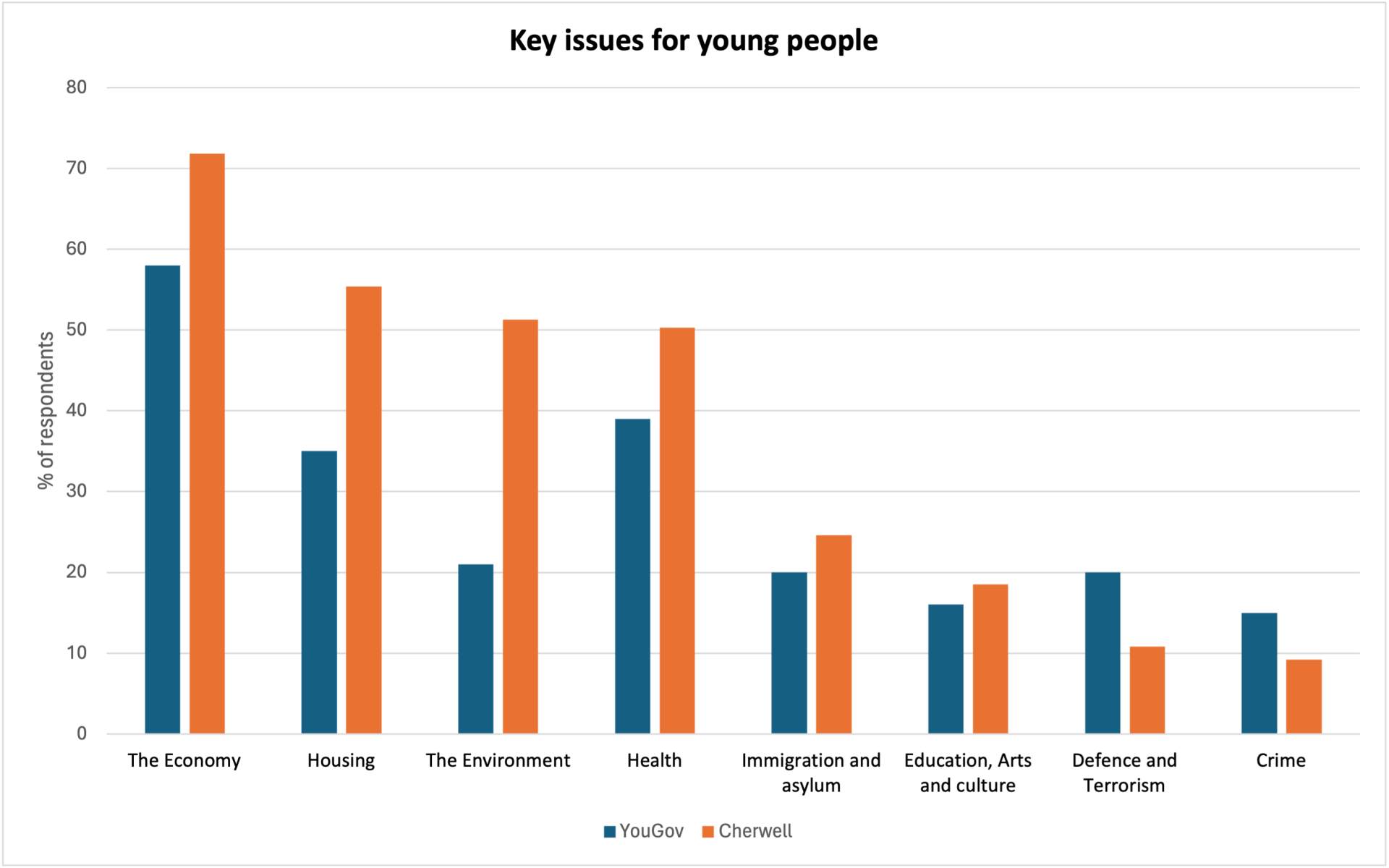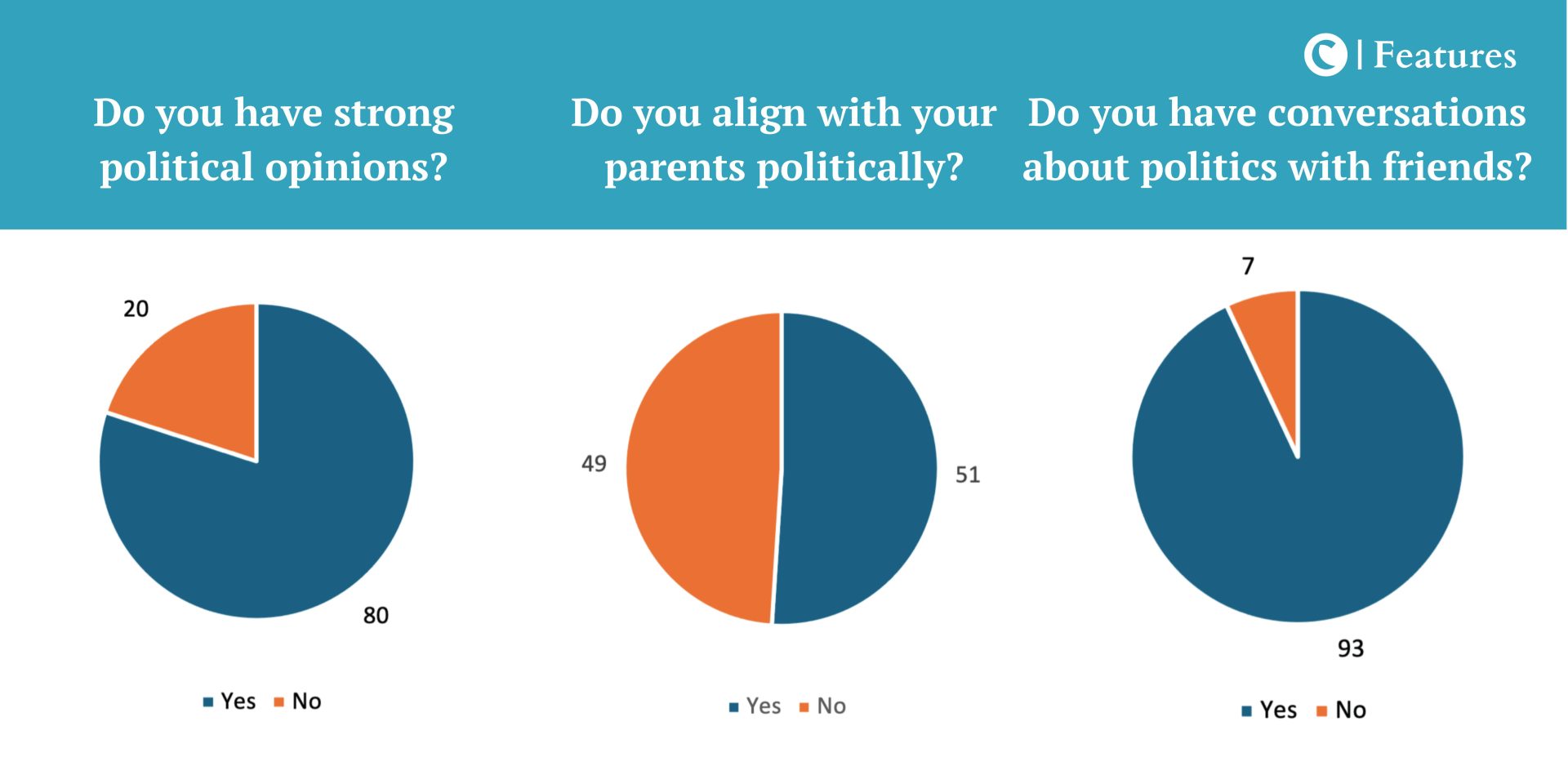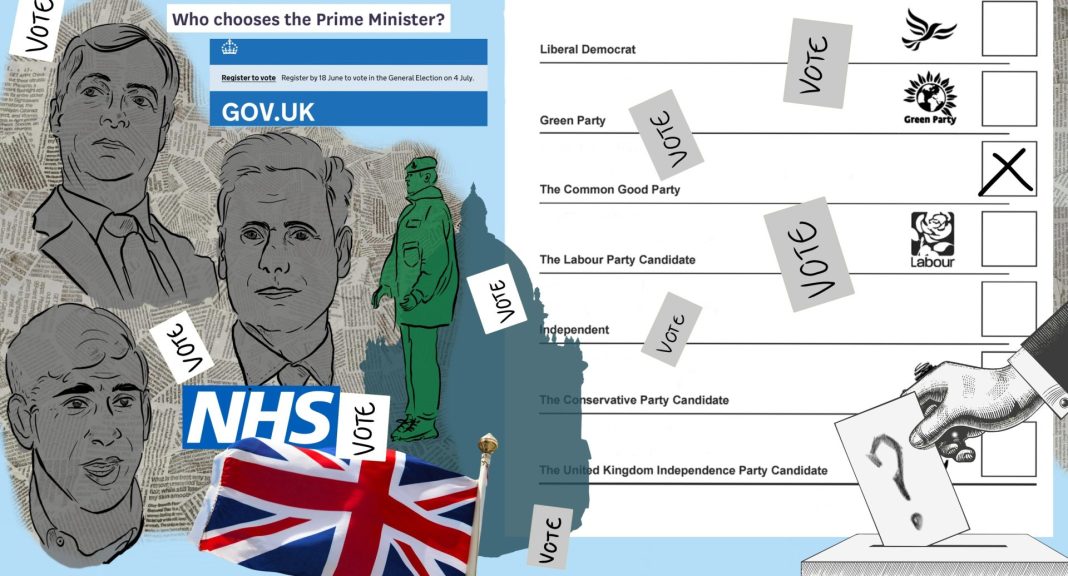Oxford is a notoriously strange place with a notoriously strange populace, one which includes Union hacks who desire nothing more than to rule the world, and scholarly types who get off on reading Schopenhauer deep into the night when most of their peers are… well, getting off, or something. We wouldn’t know.
Anyhow, with a general election on the horizon and Keir Starmer content punishing our TikTok feeds, we wanted to test the strangeness of Oxford students in the sphere of politics.
We ran the Cherwell Politics Hot Takes survey for two weeks and amassed a hoard of data which we can now share with you. With side-by-side analysis of the data we received and the latest results of YouGov polls for the age group 18-24, we have been able to provide an exclusive insight into the politics of different colleges and attempt to answer the eternal question of how the average Oxford student differs from the typical voter.
VOTING INTENTIONS
It is no surprise that Labour’s vast lead in the polls was also reflected in the voting intentions of our respondents. When asked ‘if there was a general election tomorrow, which party would you vote for?’, 57.1% responded Labour, 9.2% Conservative, 14.3% Greens, 9.2% Liberal Democrat. The rest said they wouldn’t vote, or they would spoil their ballot. A wholesome 4 people said that they would vote for Reform UK, placing their poll way below the 12% which YouGov most recently recorded for the age group 18-24.
Amongst colleges, Hertford emerged as the Greenest. Nearly two thirds of respondents from the college said that they would vote Green in an election held tomorrow, making up nearly 1/5 of all those respondents who opted for Green overall.
At the other end of the spectrum Jesus emerged as the most right wing college: ¾ of its respondents said they would vote for Reform UK or the Tories. Jesus only equalled rivals Corpus and New, however, with regard to the number of right wing voters it fielded. (Note that (T-)Oriel did not even make the ten colleges with the highest proportion of right wing voters. Clearly, its members were too busy getting their tweed ready for Port and Policy to respond to the survey.)
Viewing our results alongside those of YouGov, we found that our respondents expressed higher levels of voting intention for Labour and the Conservatives than the 18-24 year olds consulted by YouGov – in other words, a lower proportion of 18–24-year-olds nationally intend to vote for the two main parties compared to Oxford students. The most underrepresented in our data, were those intending to vote for the Liberal Democrats. Whilst the national average for the age group during May hovered around 15%, only 9% of our responded intended to vote for the Lib Dems. Oxford students remain polarised across the two main parties, with the Greens in a stronger position as the third party compared to the Lib Dems heading into the general election.
Notably, Oxford is in no way an exception to the gendered voting trends noted amongst the wider country. Much like YouGov’s survey of the differing voting intentions of men and women, Cherwell’s survey found that those who identified as female were slightly more likely to vote Labour than their male counterparts, though both genders favoured Labour generally, with 65% of women and 56.9% of men planning on voting for them in their polling booths. While neither gender seemed hugely keen on another term of Sunak, the prospect was more popular among male students— 14.7% of them plan to vote for the Conservatives, compared with only 3.8% of women and absolutely 0 non binary students. Arguably proving our superiority, The Cherwell collected voting information from individuals who identify as non-binary, 20% of whom plan to vote Labour or Lib Dem, respectively, while a massive 60% of non-binary respondents plan to vote Green at the next general election, a number that dwarfs the 16.3% of female and 8.8% of male students who intended to vote similarly.
KEY ISSUES
When asked what the most important issues facing the country are, it’s fair to say that the priorities of Oxford students are reasonably typical of their age group. According to YouGov, the economy is one of the most important issues for all Britons aged 18-24, as it was for our respondents. In both surveys, the economy won out as the most important issue by a margin of 20%.
Furthermore, both groups agree that the least important issue facing the country is crime. Even if The Sun’s dubious claim from last year that a “child crimewave is sweeping the UK” were true, neither Oxford students nor young Britons seem particularly bothered. Where the results most notably diverge concerns the environment: over half of our respondents said the issue was one of the top three most important compared to just over one fifth of respondents to the YouGov poll.

It comes as no surprise that the environment was the most important issue for those Oxford students who would vote green, with nearly 9 in 10 of those respondents selecting it as one of their top three issues. One can only speculate what is drawing the other 10% to the Green party – although Caroline Lucas’ chill vibes must count for something.
The economy remains the most important issue: for both Conservative and Labour voting respondents, over 80% of each group stated it as one of their most important issues. They differed, however, in their other priorities: around half of all Conservative voters placed defence & terrorism, and immigration & asylum as one of their top three issues. For Labour voters, the legacy of Attlee’s housing reforms, and Bevan’s NHS on their shoulders, it was housing and health that took second and third place.
Male and female respondents were fairly similar in their priorities, save that the women of Oxford are over 20% more interested in health than the men, who, in a typically strong and manly fashion, find defence and terrorism and crime to be more important, by a margin of 10% in both cases, than their female counterparts. The economy took the top spot for male and female groups. On the other hand, nationally, 6% more women (of all ages) said that health was important than said that the economy was. With age bringing the prospect of ailments and frailties that the young lassies of Oxford could never conceive of, it seems only natural that widening the age range would mean that health would come out on top.
GOVERNMENT APPROVAL & POLITICAL TRUST
As you might hope, Oxford students are more clued in (or at least more opinionated) than the average 18-24 yr old. According to YouGov, as of 27th May 2024, 25% of respondents in the age range did not know whether they approved of the government’s record to date. Of our respondents, only 3% were so diffident. Furthermore, whilst the approval rating of the YouGov poll sits at 13%, in our survey, only 7% approved of the government’s record and over 90% disapproved. All five prime ministers of the last 14 years were Oxford educated. So much for blue through and through!
Notably, no respondent who would vote Labour approved of the government’s record (the disapproval rate with this group was 98.2%). On the other hand, 52.9% of Conservative voters approved of the government, leaving a sizable 35% who disapproved and would rather have a Conservative government than any alternative arrangement. The mind truly boggles.
Oxford students are also more convinced of the brokenness of the political system. When asked “How well does Britain’s political system work?” over a third of respondents said that it sometimes appears broken, with the same number saying that it is badly broken: that amounts to nearly 7 in 10 respondents saying that our political system at least appears broken, compared with under half of respondents to the YouGov poll aged between 18-24 saying the same.
The most frequently cited reason for the broken political system was, as one student wrote: ‘in four words, first past the post’. Disillusionment with FPTP was supplemented by a more general unhappiness with the current political system – stretching from democracy as whole: ‘we’re descending into fascism hahaha’, past the unelected house of lords, the two party system, to recent political episodes: ‘A system that allows Liz Truss to be in power for a month and relies on the public for slight scrutiny is sincerely broken’.
Many respondents also commented on substantive political issues of the last 14 years as indicators of how broken the system is. Six respondents mentioned the NHS, nine the collapse of public services and the cost of living crisis. Immigration (particularly the Rwanda bill), genocide in Gaza, and climate crisis were mentioned by over ten students. The compounding of all these issues was reflected by several exasperated students writing unabashedly ‘literally nothing works’ and ‘the country has gone off a cliff’.
As young people, students were worried that ‘the NHS was on its last legs’, and that they’d never be able to afford houses (unless, someone wrote, ‘they sell their soul to corporate London’). One student wrote ‘education, the media and news outlets have people in a chokehold’, whilst another claimed ‘everything is run by a consortium of rich dudes’.
OPTIMISM ABOUT BRITAIN’S FUTURE
Given 83% of conservative voters stated they were optimistic about Britain’s future, there was also an alternative justification for optimism which was in virtue of a confidence in the current system as it stands. A University college student wrote ‘we are the best country in the world. God save the king’, whilst a Christchurchian claimed ‘Britain has all the potential in the world, it is one of the most developed countries and will only grow stronger’. Uncertainty and hope for optimism also featured prominently, with several students seeing the value in optimism but unsure if it would be naïve to embrace it.
The pessimists among us blamed the decreasing faith in politics as a result of a “struggling NHS, Brexit and the xenophobic rhetoric associated with it, cost of living crisis, education system reforms that seemed to be for the sake of making a visible change rather than actual progress.”

Those who manage to remain optimistic find hope in the “many talented people in all corners of society collectively making small improvements for everyone. The very culture of the place makes it stable and advancing.” Similarly, another respondent encouraged us not to “let the ups and downs of the past 16 years prevent us from seeing the opportunities the future presents. Politicians need to regain our trust – if they do so, it will be well earned and good cause for optimism”
STUDENT ATTITUDES TOWARDS LABOUR
It is extremely likely that Labour will form a majority government after the next election. Nearly 60% of our respondents said that they would vote for Labour in an election, suggesting that the party has enormous support among Oxford students. According to YouGov, Labour polls just as highly among young people across the country. However, Keir Starmer has notably managed to massively increase Labour’s potential vote share in all age groups since 2019 apart from among 18-24 year olds, for whom Jeremy Corbyn was just as appealing.
That Starmer’s centrist persona has the potential to disenfranchise younger voters came across in the responses to Cherwell’s survey. One respondent wrote: “Labour is offering nothing radical in a time when people are crying out for someone to say what everything is thinking: starving children, poisoning people’s blood and outing trans people to their parents is unacceptable. Keir and his gang refuse to say this, and as such, fail.” Another described Starmer as having transformed the Labour party into a “proto-Tory club, which sidelines left wing MPs,” a reference, presumably to controversy concerning Starmer’s moves to centralise candidate selection. The same respondent felt that all of this amounted to the absence of “true socialism” in the party.
One respondent seemed thrilled at the prospect of a Labour government, but did not miss out on the opportunity to have a jab at Starmer, writing: “Starmer is an unprincipled opportunist but his party will reinvest in health, education and social care, alleviate poverty, reduce corruption and cronyism, and help to heal the ruptures in this country.”
We reached out to Jack Hurrell, Co-Chair of OULC (Oxford University Labour Club) for comment broadly on the issue of Keir Starmer’s leadership and Labour’s engagement with young people.
Hurrell emphasised that “the main challenge with young people is voter turnout. Polls consistently suggest that young people overwhelmingly support progressive change in this country, but only 43% of people aged 18-24 voted in 2019. This needs to change if we are to get a labour government.”
On the subject of Keir Starmer’s image, Hurrell emphasised his broad popularity compared to Corbyn among voters nationally, noting that “according to YouGov Keir Starmer currently has a net approval rating of -9% compared to Corbyn’s -37%, with some polling agencies showing Starmer has a net positive approval rating, a rarity in British politics.” Hurrell acknowledged that Starmer’s popularity does not necessarily persist among young people, but said that “more work can be done to show Keir Starmer’s strength of character, personal empathy and kindness” evident, Hurrell said, in his years of pro-bono legal work.
Asked whether the Labour party is still a left-wing party in light of such policy surprises as Starmer’s failure to commit to ending the controversial 2 child benefit cap, Hurrell said that “Labour will always be a progressive party,” highlighting the previous Labour administration’s record on “reducing child poverty” and “making important civil rights gains for LGBT+ people.” He went on, saying that “Keir Starmer has been clear that we want to end the 2 child benefit cap when the economic situation allows and that is incredibly important to a lot of Labour members like myself.”
OUCA were also approached for comment on the current state of the Conservative party; we are yet to hear their response.


